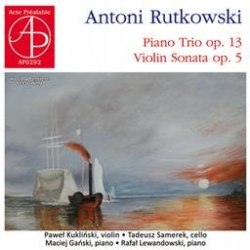|

Support us financially by purchasing
this disc through MusicWeb
for £13.50 postage paid world-wide.

|
Antoni RUTKOWSKI (1859-1884)
Piano Trio in G minor, Op.13 (1878) [24:41]
Violin Sonata in C minor, Op.5 (1882) [29:18]
Paweł Kukliński (violin)
Tadeusz Samerek (cello)
Maciej Gański (piano: trio)
Rafał Lewandowski (piano: sonata)
rec. May and June 2013, Radio Gdańsk, Studio Koncertowe im. J Hajduna
ACTE PRÉALABLE AP0292 [54:04]
Antoni Rutkowski’s life was short. Born in Warsaw in 1859 he was a pianist, teacher and composer, having earlier studied in the city with Moniuszko and Żeleński. Early promise - he graduated from the Institute of Music when only seventeen - was no obstacle to his succumbing to TB at the age of 27.
The earlier of the two chamber works selected to represent his art in this disc is the 1878 Piano Trio which was premiered by a leading Polish trio of the time, one which included no less a figure than Paderewski. We’re fortunate that he left behind reminiscences of Rutkowski whom he seems to have known quite well. He was certainly admiring of his talent, though not uncritically so. He wrote of ‘enthusiasm, boldness and arrogance which only the young can have’. Yet he wrote too of some formal musical problems. Both comments are just. It’s certainly the case that there’s a leaping vigour in the opening of the three movements, a captivating dancing brio. The demerit is the sequential nature of his ideas, and a lack of formal control of his material. If he had summoned up stronger contrasts this movement would have been highly effective. As it is it’s still exciting enough, if you’re prepared, as Paderewski was, to admit the problem but absorb it. Don’t be alarmed at the documentation labelling the central movement an Allegro; I’m sure Andante is meant. The slow unfolding of the lyricism, largely via the violin - which becomes increasingly agitated - is augmented by Mendelssohnian piano chording. The finale is elegant and, despite one or two what I’d call connective problems, very agreeable. I don’t know the tempo indications but I wonder if this performance is quite con fuoco enough.
The Violin Sonata was completed four years later. Importantly the two instruments are equal partners - which is perhaps reflective of Rutkowski’s stature as a pianist. Yet I find it an inferior work to the Trio. The first two movements are rather long for their material. The slow movement is Late-Romantic in cast but lacks distinction in practice. And whilst there’s an avuncular Intermezzo, it’s difficult for the performers to sculpt a sense of logical progression from the disparate material. The finale is, in any case, the most engaging movement. Rutkowski was too cosmopolitan to stuff his music with overt dance patterns but is still Polish enough to embody the Krakowiak and Oberek in more subtle ways. Thus there’s fervour and animation, and a fine rhythmic pull.
The performances are faithful, but maybe a little on the small-scaled side, though it’s hard to be in any way judgemental given that these are world premiere recordings. The booklet notes are very helpful, the recording pretty reasonable too.
Jonathan Woolf
|











